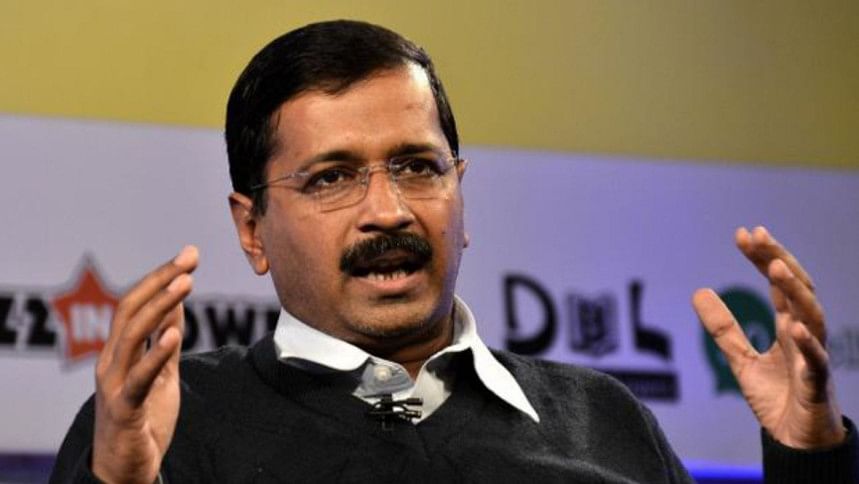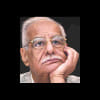Is AAP going Janata way?

WHEN movements convert themselves into political parties they lose their original shape. The ethos of collective leadership takes a backseat and the personal assertion comes to the fore. Power gets concentrated in one person. In reality, the leadership acquires the meaning of one-man rule, which becomes synonymous for the party.
It was expected that the Aam Aadmi Party would be different because it was a product of people's aspirations. The well entrenched political parties like the Congress and the Bhartiya Janata Party (BJP) were run down because they had become part of old furniture. When people see the AAP going in the same direction they feel betrayed because they thought that the party would introduce a new way of thinking, a fresh approach to politics, transparent, clean and open.
Unfortunately, the same one-man cult has taken over the party. Granted, Arvind Kejriwal was bound to occupy the central position because he was elected to lead the party which swept the polls in Delhi. Yet the ethos of Aam Aadmi Party demanded that he would act as a leader of the equals. This is where the fault lies. Kejriwal tends to concentrate power in himself. Not only that, he was seen as being behind the ousting the two co-founders of the party, Yogender Yadav and Prashant Bhushan from the National executive, the apex body for the decision making.
That Kejriwal had a majority in the party's executive does not mean that he would be the sole spokesman. Once where there is a trial of strength even the executive gave him a divided verdict, 11 to eight.
Every day new disclosures are coming out in the open. One is that Kejriwal had maneuvered to oust from the AAP the critics of his style of functioning. The second is that he is using his official position of Delhi's Chief Minister to bash his critics. I hope that all this is not true and the inner democracy that the party promised is intact. But the functioning is disconcerting.
The party's inner Lokpal has also expressed his unhappiness over the manner in which the AAP is functioning. He has expressed his helplessness. It is heartening to know that he is not accepting defeat but is appointing an inquiry committee for a probe. Probably, he should have threatened to quit to jolt the party and make it realise that the functioning of Kejriwal is far from healthy.
The AAP is a child of a movement which Anna Hazare initiated against corruption. Why has he not taken up on himself the task to ensure that those who control the party act to complete the task of appointing Lokpal (Ombudsman) at the Centre to eliminate corruption in high places? Instead, Anna Hazare has run away from his responsibility and hidden his failure behind a movement on a land bill.
Probably, Anna Hazare realises that his word would not be respected. This is precisely what the Gandhian Jaya Prakash Narayan felt. He had founded the Janata Party which had appointed Morarji Desai as the prime minister. The fact is that Morarji did not listen to J.P. should not have made him withdraw from the field. He should have joined issue with Morarji, who was only a creature of the J.P. movement.
I recall telling JP that the people voted at his behest and expected him to intervene to make the Central government work according to the movement's ideals. He did not contradict me but explained that his health did not allow him to go to the public again. This was another way of admitting that he did not want to join issue with Morarji lest the Janata Party should get a bad name.
This was JP's rationalisation. He knew Morarji would not listen to him. I thought I would approach Morarji. When I told him that JP would have come to Delhi, but his health did not allow him to do so. I thought I had given a sufficient hint. Morarji understood what I wanted to convey. He said in anger that JP was mistaken that he would go to meet him. "I did not go even to meet Gandhi. JP is not above him," said Morarji. It is not surprising that the Janata Party cracked up and practically died.
Anna Hazare can end the obsession of Kejriwal to kill dissent. The fact that he sits on dharna with Anna Hazare on a Land Bill should not hide the fact that Kejriwal wants to oust the critics from the party. Yogender Yadav and Prashant Bhushan are among the founders of AAP. Kejriwal has seen to it that they are out of the decision making bodies. He does not realise that they have a large following of their own. He should not emulate the example of Morarji Desai who destroyed the Janata Party, which had nominated the prime minister, but did not accommodate others.
It looks as if the AAP is going the way of Janata Party. It is a pity that the supporters of Kerjriwal, instead of correcting his authoritarian methods, are going for the critics. He should know that if the experiment of AAP fails, it would take years for the alternative to the Congress and the BJP to build.
The writer is an eminent Indian columnist.

 For all latest news, follow The Daily Star's Google News channel.
For all latest news, follow The Daily Star's Google News channel. 



Comments